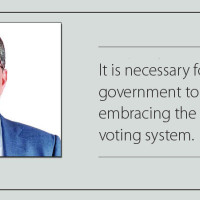- Wednesday, 11 February 2026
Corruption Sapping Local Governments
Many local governments across Nepal have proved their mettle by improving service delivery as per the people’s needs and aspirations. Among the three-tier governments, the local government institutions remain the closest to people when it comes to delivering services. As they are always with the people, it naturally becomes easier for them to be familiar with the local problems and deal with them efficiently. The federal constitution has devolved numerous state functions and powers to the local governments so as to enable them to run administrative as well as development activities in a smooth manner. The Local Government Operations Act, 2017 defines their responsibilities and functions clearly. Realising peace and stability, ensuring good governance and justice, and contributing towards socio-economic development are some of their key responsibilities being entrusted to the local governments.
The Act also gives the local governments the authority to work in the areas of physical infrastructure development, protection of forests and the environment, and disaster management. Considering their numerous powers and functions, such governments are often dubbed as ‘Singha Durbar’ in villages. But, what is disappointing is that a lot of local levels seem to have been unable to maintain their positive public image due to a rising rate of corruption and other irregularities. Together with the delegation of state powers, corruption appears to have been devolved to the local levels.
Anomaly
Cracking down on such an anomaly has emerged as a major challenge before the anti-corruption bodies like the Commission for Investigation of the Abuse Authority (CIAA),with the misuse of authority and public resources for personal gains becoming rampant nationwide. Some of the local governments have failed to win the hearts and minds of the people because of their random adoption of development projects. Such governments are sometimes accused of designing development schemes with a sole intention of misappropriation of resources. There has also been a tendency among local levels to introduce programmes and projects without doing proper research and homework.
When the local leaderships are incapable of having a vision for development and welfare of the people, they are seen opting for replicating projects from others instead of introducing practical schemes on their own. Teams deployed by the CIAA have caught numerous local government officials, including elected people’s representatives and employees, red-handed while receiving graft amounts from service-seekers. This really hints at an alarming corruption scenario of the country. What is worrying is that no political parties seem to have remained tight-lipped about the growing level of corruption. Instead, they are usually found making attempts to protect those indicted.
The CIAA has lately filed cases against some mayors, deputy mayors and other officials on charge of corruption at the Special Court. Godawari Municipality in Lalitpur district has become one of the local governments in the country to have its mayor and deputy mayor indicted. Fresh reports of constitutional bodies like the CIAA and the Office of the Auditor General (OAG) have painted a grim picture of irregularities in local governments. The CIAA’s documents show that fiscal irregularities and policy-level corruption have been widespread in the local levels. Both office-bearers and employees are blamed for working in collusion just to receive bribe money from the beneficiaries.
This means that they get involved in irregularities right from the formulation of any plan and programme to its implementation. This is one of the reasons why development work is of substandard there. A survey conducted by the CIAA some years back had indicated that corruption in local levels kept on thriving even after the promulgation of the federal constitution and the first election to the local governments. The survey had been conducted in 15 different districts from all seven provinces. The report exposed that that local government employees as well as the elected representatives were involved in fraudulent activities. But even after the disclosure of that survey report, no remarkable step seems to have been taken to contain irregularities at the local levels.
Previously, an all-party mechanism had been assigned to operate each of the local units before the introduction of the new national charter in 2015. During that period, even the political leaderships had conceded the fact that the local units had been plagued by corruption. Similarly, the OAG’s report for the fiscal year 2022-23 also shows a distressing status of corruption in local levels. According to the report, audits were done for Rs. 1.1375 trillion throughout 746 local governments, and there were inconsistencies amounting to Rs. 35.67 billion. Arrears in local levels had remained quite extensive in the previous fiscal years as well.
Tougher measures
There is no doubt that the unchecked corruption in local levels has posed a severe challenge to efficiency in service delivery, dampening the people’s high hopes. If tougher measures are not taken on time to check corruption, there is a possibility of many more local levels being turned into more corrupt institutions in no time. The judiciary and the anti-corruption bodies alone cannot help control irregularities in local levels. As the major stakeholders, the political parties have a crucial role to play in freeing the local governance institutions from the clutches of corruption. They must remain alert against such anomalies.
Besides, they need to express their commitment that they will nominate only competent and those having good track records for the upcoming local level elections. It is also necessary for the local people to oversee the activities of the local governments in their respective areas. They must get prepared to voice against corruption and other irregularities in public. Such campaigns can help bring corruption under control, to a great extent.
(The author is a former deputy executive editor of this daily.)
















